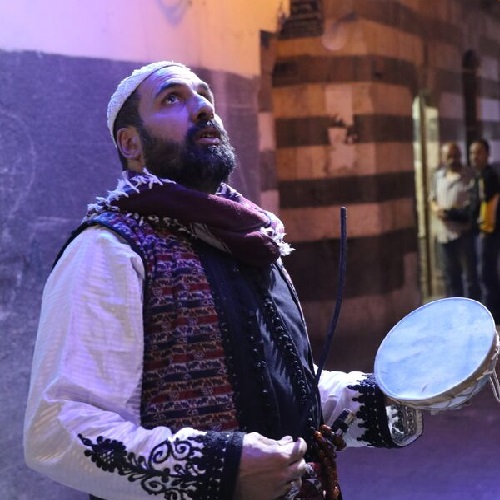One of the traditions that many Syrian areas have not abandoned in Ramadan month is the way to call Muslim people for Suhur (the meal eaten early in the morning before dawn) by Mosaharati, who beats drums in attractive rhythms and chants “It is time to take Suhur. There’s God’s blessing in Suhur.”
Al-Mosuharati is a volunteer, who applies to his governorate to do this free task, and he takes Edeyeh [Money given to people on the occasion of Eid] from the people whom he waked up at the end of the month of Ramadan.
Over the past years there were 60-75 Mosaharati in Damascus, according to local reports.
Abo Hasan, 45- year- old man, is Mosaharati in Al-Midan district in Damascus. He inherited this job from his father.
“Al-Mosahariti’s voice should be beautiful when he calls people to wake up. I will preserve this job and pass it on to the next generation…..I enjoy this job,” he told Syria Times e-newspaper.
The job of Mosaharaty first appeared in Cairo during the time of Abbasid caliphs. Otbat Bin Ishaq, then governor of Egypt, was the first known Mosaharati. He walked through the streets of Cairo to remind people about the time of Suhur in the year 228 AH.
It was not an easy task. Bin Ishaq had to exert great efforts to uphold the tradition by walking from the military (Askar) city to Fustat, chanting: “Ebadallah, tasahharoo, fainna fissahuri Baraka.” (O the servants of Allah, it’s time to take Suhur. There’s God’s blessing in Suhur.)
During the time of the Fathimides, Al-Hakim Bi Amrillah issued a decree asking people to sleep early after the Taraweeh prayer. At the same time, he instructed military officers to knock at the doors of people to wake them up for suhur.
With the passage of time, the rulers appointed individuals or mesaharaties to wake people up for suhur. They knocked at the doors using the sticks they carried while roaming around the cities and villages.
To sum up, Al-Mosuharati, who has been an icon of Ramadan in many Arab countries for centuries, has become a part of folklore that is slowly dying.
The goal of fasting in Ramadan [To refrain from eating and drinking from dawn to dusk] is to understand and empathize with the less fortunate and offer them what make them happy.
Fasting is also healthy and increases well-being.
Basma Qaddour

